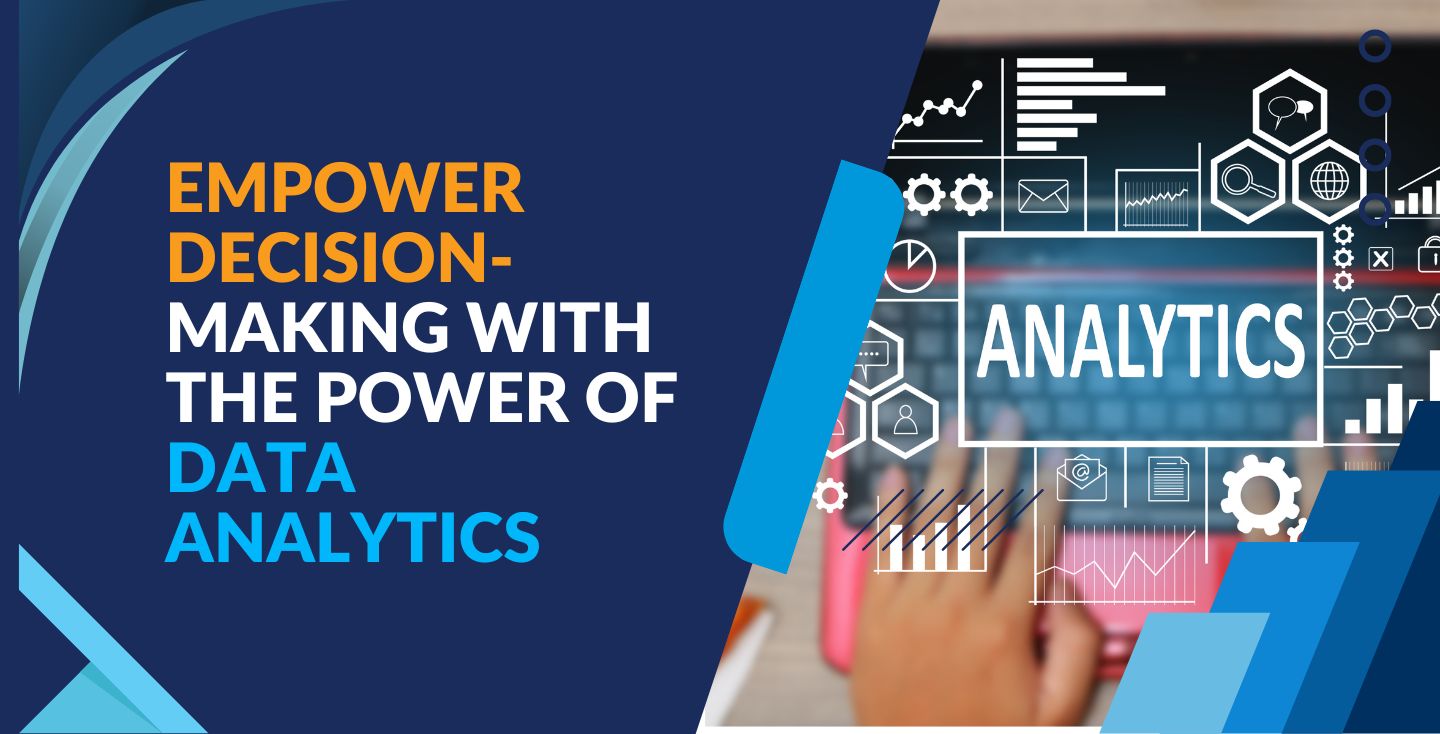Empower Decision-Making with the Power of Data Analytics
 Gourav Sapra
Gourav SapraTable of contents

The capacity to make educated decisions has become essential in the ever-changing economic and technological landscape. The rise of data analytics has changed how businesses function by enabling them to gain useful insights from massive amounts of data. In this thorough guide, we'll examine how data analytics services and products supplied by data analytics firms may facilitate decision-making, foster strategic expansion, and give a competitive edge.
Understanding the Essence of Data Analytics:
- What is Data Analytics?
Analyzing raw data to get pertinent insights and conclusions is the process of data analytics. It involves the use of various techniques and tools to uncover patterns, correlations, and trends within datasets.
- The Significance of Data Analytics:
Data analytics enables organizations to move beyond intuition and gut feelings when making critical decisions. By harnessing the power of data, businesses can gain a deeper understanding of customer behavior, operational efficiency, market trends, and more.
The Role of Data Analytics Services & Solutions
- Leveraging Expertise from Data Analytics Companies:
Data analytics services & solutions offered by specialized companies bring a wealth of expertise to the table. These companies possess the technical knowledge, tools, and experience to navigate the complexities of data analysis.
- Customized Data Solutions:
Data analytics companies tailor their services to meet the specific needs of their clients. Whether it's predictive analytics, prescriptive analytics, or descriptive analytics, businesses can find solutions that align with their goals.
The Process of Data Analytics
The journey of data analytics involves a series of well-defined steps, each contributing to the overall goal of extracting actionable insights from data.
- Data Collection:
The initial stage is to compile pertinent information from various sources. This can include customer transactions, online interactions, sensor readings, and more. The quality and comprehensiveness of the data directly influence the accuracy of the insights obtained.
Example: A retail company collects data from its online store, tracking customer purchases, browsing behavior, and demographics.
- Data Cleaning and Preparation:
Raw data is often messy, inconsistent, and riddled with errors. Data analysts must clean and preprocess the data, which involves removing duplicates, handling missing values, and standardizing formats.
Example: In a dataset containing customer addresses, some entries might have typos or missing information. Data cleaning ensures that addresses are standardized for accurate analysis.
- Data Transformation:
Once cleaned, the data may need to be transformed into a suitable format for analysis. This can involve aggregating data, creating new variables, or converting categorical data into numerical formats.
Example: In a sales dataset, individual transactions might be transformed into monthly sales totals to analyze monthly trends.
- Data Analysis:
This is the heart of the data analytics process, where various techniques are applied to extract insights. Statistical analysis, machine learning algorithms, and data mining methods are employed to identify patterns and correlations.
Example: Using historical sales data, a business might employ a machine learning algorithm to predict future sales based on factors like seasonality and marketing campaigns.
- Interpretation and Visualization:
The insights gained from data analysis need to be translated into actionable information. Data visualization tools are used to create charts, graphs, and dashboards that make complex data easier to understand.
Example: A bar chart displaying sales performance over different quarters can quickly communicate which periods were the most profitable.
- Decision-Making:
Ultimately, the goal of data analytics is to support decision-making. Armed with insights, organizations can make informed choices that optimize processes, enhance customer experiences, and drive growth.
Example: An e-commerce company uses data analytics to identify the most popular products and tailors its marketing strategy accordingly.
The Benefits of Data Analytics
- Data-Driven Decision-Making:
Data analytics replaces guesswork with evidence-based decisions, reducing the risk of costly errors and improving overall business outcomes.
- Competitive Advantage:
Organizations that harness data analytics gain a competitive edge by identifying market trends, consumer preferences, and emerging opportunities ahead of the competition.
- Enhanced Customer Experience:
By understanding customer behavior and preferences, businesses can tailor their offerings to meet customer expectations, leading to increased customer satisfaction and loyalty.
- Operational Efficiency:
Data analytics identifies inefficiencies in processes, enabling businesses to streamline operations, reduce costs, and allocate resources more effectively.
- Risk Management:
Data analytics helps organizations identify and mitigate potential risks, enabling them to make proactive decisions to prevent potential crises.
The Future of Data Analytics
As technology continues to advance, data analytics is poised for further growth. The integration of artificial intelligence and machine learning will enhance predictive capabilities, allowing businesses to anticipate trends and outcomes with greater accuracy.
Why Choose a Data Analytics Company:
The choice to partner with a data analytics company holds unparalleled significance for businesses seeking to leverage their information for growth and innovation.
Amplifying Expertise for Informed Decisions
Personalized Solutions for Tailored Success
Harmonizing with Cutting-Edge Technology
Fortifying Data Security
Mastering Diverse Analytics Techniques
Cultivating Effective Collaboration
Translating Insights for Strategic Alignment
Drawing Confidence from Proven Success
Considerations to Make When Selecting a Data Analytics Company:
- Expertise and Experience:
Evaluate the company's track record and expertise in data analytics. A company with a proven history of delivering successful analytics solutions demonstrates its capability to handle complex projects.
- Customization:
Consider a company's ability to tailor its services to your organization's unique needs. One-size-fits-all solutions may not address your specific challenges and objectives.
- Technological Infrastructure:
Evaluate the company's technological stack, tools, and platforms. Ensure they align with your organization's data environment and requirements.
- Data Security:
Data security is paramount. Choose a company with robust data protection measures to safeguard sensitive information from breaches and unauthorized access.
- Analytics Techniques:
Assess the range of analytics techniques the company employs. These may include descriptive, diagnostic, predictive, and prescriptive analytics, each serving different business needs.
- Communication and Collaboration:
Effective communication is key to successful collaboration. Choose a company that understands your business goals, communicates transparently, and fosters collaboration.
- Data Visualization and Interpretation:
Data visualization turns complex insights into understandable visuals. Look for a company that excels in creating intuitive charts, graphs, and dashboards.
- Scalability:
Consider whether the company's solutions can scale with your business growth. Scalability ensures that analytics solutions remain effective as your data volume increases.
- Client References and Testimonials:
Request references or read testimonials from the company's previous clients. Real-world experiences provide insights into the company's capabilities and customer satisfaction.
In Conclusion
Data analytics services and solutions have transformed decision-making processes across industries. Businesses that harness the power of data analytics gain a competitive edge, make smarter choices, and uncover opportunities that might otherwise remain hidden. By partnering with experienced data analytics companies, organizations can unlock the potential of their data, paving the way for innovation, growth, and success in an increasingly data-driven world.
Subscribe to my newsletter
Read articles from Gourav Sapra directly inside your inbox. Subscribe to the newsletter, and don't miss out.
Written by

Gourav Sapra
Gourav Sapra
Gourav Sapra is a versatile author and technology enthusiast dedicated to empowering businesses in the dynamic digital world. With extensive knowledge of emerging technologies and a keen eye for industry trends, Gourav is committed to assisting organizations in harnessing the power of technology to foster innovation and accomplish their strategic goals.